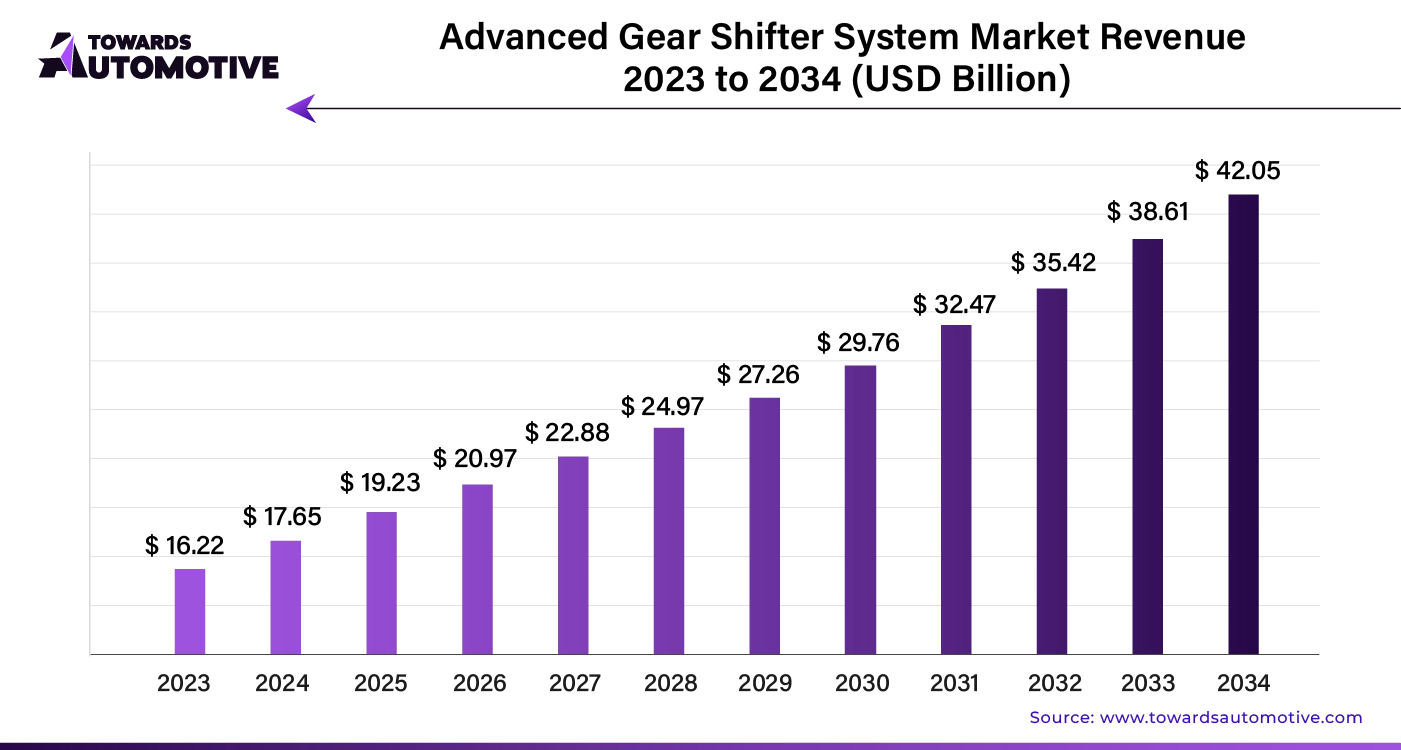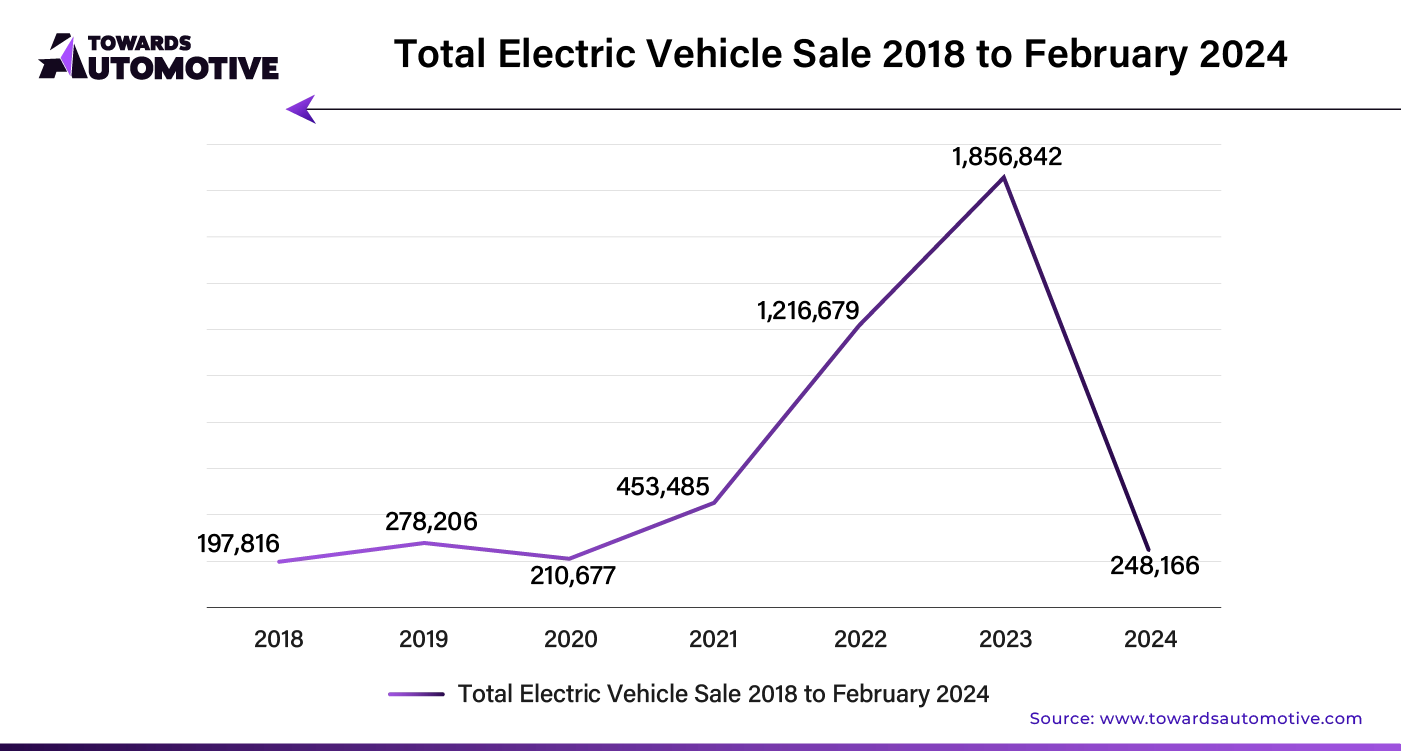April 2025
The global advanced gear shifter system market size is calculated at USD 17.65 billion in 2024 and is expected to be worth USD 42.05 billion by 2034, expanding at a CAGR of 8.95% from 2023 to 2034.

Unlock Infinite Advantages: Subscribe to Annual Membership
The surge in electric and hybrid vehicle sales is driving the need for advanced gear shift systems tailored for these vehicles. Automakers are adapting their product portfolios to align with the shift to electric powertrains, making sophisticated gear shifters essential for maximizing efficiency and customer satisfaction.
Dynamic shifting profiles are now a key feature, offering a range of driving modes such as eco-friendly for fuel savings and performance-oriented for spirited driving. This flexibility enhances market appeal and helps automakers stand out by catering to diverse consumer preferences. The automotive market valued at USD 4,070.19 billion in 2023, is experiencing growth and is projected to surpass USD 6,678.28 billion by 2032, with a significant CAGR of over 5.66%.
Furthermore, the integration of electronic gear shifters with advanced driver assistance systems (ADAS) is becoming a strategic move. This integration supports features like automated parking and adaptive cruise control, improving vehicle safety and positioning companies as leaders in smart technology and automation.
Trends:
Opportunities:
Challenges:

The automatic shifter segment is leading the market, with a projected growth rate of 8.5% CAGR from 2024 to 2034. This technology is especially valued due to increasing urbanization and rising traffic congestion in city areas. Automatic gear shifters are highly advantageous in stop-and-go conditions, as they reduce driver effort and ensure smooth gear transitions. As urban environments expand, the demand for automatic gearboxes continues to rise, providing a practical solution for daily commuting issues.
Additionally, automatic gearboxes have become the preferred choice in many regions, boosting vehicle resale values. Compared to manual gearboxes, vehicles equipped with automatic transmissions are considered more modern and attractive, leading to higher resale prices and increased consumer demand.
In contrast, the solenoid actuator segment is experiencing significant growth, expected to reach a 8.3% CAGR through 2034. Solenoid actuators are popular due to their cost-efficiency and scalability in production. Automakers prefer these actuators for their affordability and effectiveness, making them a common choice for integrating smart gear shift systems across various vehicles. Continuous advancements in solenoid technology, including the development of new materials and improved production techniques, enhance their performance and solidify their role in advanced gear shifter systems.
South Korea Leads Market Expansion
The advanced gear shifter systems market is set to experience the fastest growth in South Korea, with an impressive CAGR of 11.3% from 2024 to 2034. This surge is primarily driven by the booming electric scooter market and substantial government support for electric vehicles (EVs). Manufacturers in South Korea are capitalizing on the demand for efficient, sustainable urban transportation solutions, which positions them favorably in a rapidly evolving sector.
Japan’s Market Surge
Japan is also witnessing robust growth, with a projected CAGR of 10.5% over the same period. The country’s preference for kei cars and compact vehicles is fueling demand for advanced gear shifter systems. Japanese manufacturers are responding to this trend by designing compact, space-efficient solutions that align with both traditional aesthetics and modern functional needs.
China’s Expanding Influence
In China, the market for advanced gear shifter systems is expected to grow at a CAGR of 9.8%. The rise of the New Energy Vehicle (NEV) sector is a significant driver, as manufacturers tailor their products to the needs of electric and hybrid vehicles. Additionally, the growth of eCommerce and last-mile delivery services is influencing the design of gear shifters to accommodate frequent stop-and-go scenarios in commercial electric vehicles.
United Kingdom and United States Trends
The United Kingdom and the United States are experiencing steady growth, each with a projected CAGR of 9.3%. In the UK, the focus is on integrating gear shifter systems with plug-in hybrid electric vehicles (PHEVs) and catering to the demand for customizable driving experiences. Meanwhile, in the US, the popularity of ride-hailing services and shared mobility is shaping the demand for durable and user-friendly gear shifters suitable for high-usage vehicles.
The advanced gear shifter system market is highly competitive, featuring both established automotive suppliers and innovative tech startups. Key players like ZF Friedrichshafen AG, BorgWarner Inc., and Continental AG leverage their extensive R&D capabilities and global manufacturing networks to address diverse automaker needs.
Recent developments include SRAM's launch of a new powertrain e-bike drive system in September 2023 and Tesla's introduction of a touchscreen gear shifter in its updated Model X and Model S in April 2021.
AI integration is revolutionizing the advanced gear shifter system market by driving innovation and efficiency. By leveraging machine learning and data analytics, AI enhances gear shifter systems’ performance, providing smoother and more precise shifting. AI algorithms can predict driver behavior and optimize shifting patterns, leading to improved vehicle responsiveness and fuel efficiency.
Advanced AI systems can also identify potential issues before they arise, allowing for proactive maintenance and reducing downtime. This capability not only enhances vehicle reliability but also reduces overall maintenance costs. Furthermore, AI’s ability to process real-time data ensures that gear shifter systems adapt to varying driving conditions, delivering a personalized driving experience.
As automotive manufacturers increasingly adopt AI technologies, they gain a competitive edge, fueling market growth. The integration of AI streamlines production processes, enhances product quality, and accelerates innovation, making it a key driver of market expansion. Overall, AI’s role in advancing gear shifter systems is pivotal in shaping the future of automotive technology, ensuring sustained growth and development in the market.
In the advanced gear shifter system market, supply chain management plays a crucial role in ensuring timely production and delivery. The process begins with suppliers providing high-quality raw materials, such as metals and composites, essential for manufacturing gear shifters. These materials are then transported to production facilities, where advanced technology and skilled labor combine to create precise gear shifters.
Once assembled, the gear shifters undergo rigorous quality control checks to meet industry standards. Finished products are packaged and distributed through a network of logistics partners. Efficient warehousing and inventory management systems ensure that products are readily available to meet market demand.
Coordination between suppliers, manufacturers, and distributors is vital for minimizing delays and optimizing resource use. Real-time tracking and communication systems help manage inventory levels and address any issues promptly. As the market grows, adapting supply chain strategies to accommodate increased demand and technological advancements will be key to maintaining competitive advantage and customer satisfaction.
The advanced gear shifter system market thrives on several key components and contributions from leading companies. Central to this ecosystem are electronic shifters, mechanical components, and control units. Electronic shifters provide precision and reliability, enhancing the driving experience. Mechanical components, such as linkages and actuators, ensure smooth gear transitions, while control units manage the shifting process through advanced algorithms.
Companies like ZF Friedrichshafen, BorgWarner, and Aisin Seiki lead the market by integrating cutting-edge technology into their products. ZF Friedrichshafen focuses on developing electronic shifters with enhanced functionality and user interface improvements. BorgWarner contributes by advancing mechanical systems that offer robust performance and durability. Aisin Seiki excels in creating integrated control units that optimize shifting efficiency and vehicle dynamics.
Other notable contributors, including Jatco, Hyundai Dymos, and Getrag, also play crucial roles. Jatco develops innovative gear shift systems that cater to various vehicle types. Hyundai Dymos enhances the market with its focus on precision engineering for smoother gear transitions. Getrag, now part of Magna International, contributes through advanced transmission technologies that integrate seamlessly with gear shifters.
By Technology
By Component
By Vehicle Type
By Region
April 2025
April 2025
April 2025
April 2025
Dr. Arjun Patel is a distinguished expert in the automotive industry, holding advanced degrees in Automotive Engineering and Mechanical Engineering. His expertise spans automotive market dynamics, technological advancements, and sustainable practices. Dr. Patel excels in conducting in depth research and analysis on market trends, consumer preferences, and the economic implications within the automotive sector. He is renowned for his insightful publications on topics such as electric vehicles, autonomous driving technologies, and the evolution of sustainable transportation solutions. Dr. Patels research contributions have significantly advanced understanding in the field, earning him recognition as a leading authority in automotive research and analysis.
We offer automotive expertise for market projections and customizable research, adaptable to diverse strategic approaches.
Contact Us